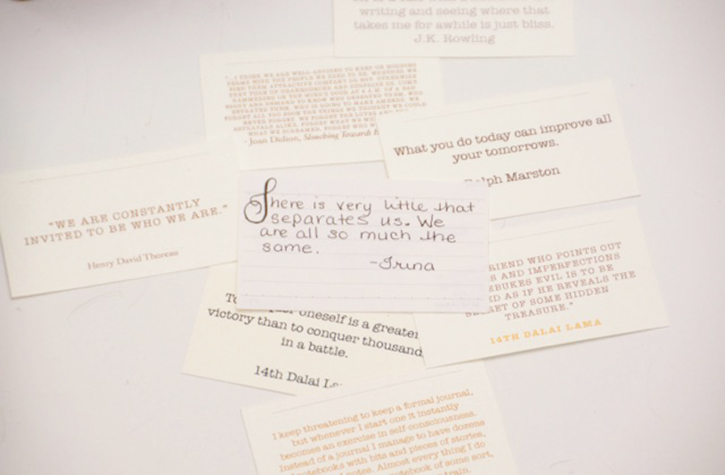You Were Once a Philosopher
When is the last time you posed a complex question to a child - the type of question that might lead on to conclude some sort of maxim or universal truth? I suggest you try it because if your experiences are anything like my own, you will find that many children, perhaps most, are more philosophical than the majority of adults.
A few months ago, while driving in the car with my sons, Aidan, 13, and Cormac, just 8, I posed the following question, Do you think it would be cool to be happy all the time? It didn’t take long for the youngest to answer. He quite confidently said he would not like to be happy all the time because then happiness would be the only emotion he knew and that would not be good.
If happiness was our only emotion, then we would not be able to appreciate it for what it is. ~ Cormac, age 8

We visited Philadelphia this week on a family vacation. Philadelphia is an absolutely amazing city, rich with culture, history, wonderful food, art, and homeless people. There are a lot of homeless people along the street, most holding signs that read something like “homeless but not hopeless.” I gave a few money, but not all. One was a man that spoke to me, a bilateral amputee, and the other was a young boy, who played clarinet while sitting atop an overturned bucket. At first, I thought the young boy was busking, playing his instrument for money, but he stopped playing when I passed by and begged for spare change. I told him I’d just given all the change I had to someone else, as I’d given it to the older man, who was missing both legs. He thanked me anyway and went back to playing his clarinet. When we reached my mother, where she was seated waiting for us, I asked her for change. I took it back to the boy playing clarinet, and he thanked me/us graciously.
These exchanges, particularly the one with the clarinet player, left me wondering what made me choose to give money to him and not to some of the others we’d passed. What struck me was how few made eye contact with me. When I wrote about it in my notebook, I considered whether homeless but not hopeless was a lie because those who didn’t look at me seemed without hope. I asked my 13-year-old if he’d felt more of a connection with the homeless people who looked us in the eye, and he said yes because their eyes were talking to us. He went on to say that’s what eyes do, they speak without using words. He thought about it some more and clarified that it was, of course, dependent upon the person and the situation.
Our eyes can speak, even when there are no words. ~ Aidan, age 13
Why was it so easy for Aidan and Cormac to hear their inner sages and it seems to be so difficult for other, even those with much more life experience?
Listening to Our Inner Voice …
Can you hear your inner voice? It’s not always a bad thing to hear voices. Our inner sage is the voice within each of us that we have sadly learned to sometimes ignore. Most of us have heard its whisper, at one time or another, and chosen not to heed its advice. Later we’ll kick ourselves, saying or thinking, “I should have listened to my gut.” But our gut or our instinct is really not an instinct at all. Instinct is basically a fixed pattern of behavior that an animal has. But what we ignored was something a little different. What we often fail to listen to is our wisdom. What’s worse is some of us fail to realize how much inner wisdom we actually possess.
Children, like my own two boys, are aware of their inner wisdom and they place some faith in it. Often the older we get, the less we are sure of. And while some of this might have to do with the fact that we come to realize that life is full of complexities we didn’t always consider, often I think this happens because we learn self-doubt. We are still in search of wisdom. Every day someone is quoting something on social media, and we allow it to inspire us. We’ll do quick Google searches, looking for words of wisdom or quotations about a certain topic, words that will inspire us. For example,
Strive not to be a success, but rather to be of value. – Robin Sharma
Yes, yes, we think. Being of value is most important. We will jot it down in our notebook or post it on Facebook or Instagram or some other social platform. We are moved and try to incorporate this new thinking into our own value system. Sometimes, further research will reveal that they are credited to the wrong person, but no matter. The above quote about success and being of value is actually attributable to Albert Einstein, though I’m quite sure Robin Sharma talked about the same thing in a recent podcast. In any event, we seek these ideas, these maxims, these sort of universal truths, because they help us make sense of the world.
But why aren’t we listening to our own voices, like many of us, once did when we were kids? There are probably a number of reasons. For one, life experiences can often lead us to doubt ourselves and lose confidence in our own wisdom. Instead of being taught to trust ourselves, we are often taught just the opposite, and to trust, instead, those we place in positions of authority or assume are smarter than we are. And then there’s the noise of life, which can make it difficult to filter out the wisdom because that means having to organize our thoughts and staying with our thoughts long enough to draw some conclusions.
Revealing Your Inner Wisdom
I’ve said it many times before, writing is organized thinking, and personal writing helps us organize things that make up the very essence of who we are, including our core values and beliefs. It’s easy to say things that we really haven’t thought through thoroughly. For example, I’ve heard many people claim that they are not “happy.” I often come back to the idea of happiness being it is something that is of great interest to me. But when you ask most people to define “happiness,” it’s not so easy to do. We all think we know what it feels like, much like love, but these abstract and complex ideas are difficult to define. Life is full of complexities and nuances and abstractions, or perhaps we complicate life, but whatever the case may be, really organizing our thinking is, for many, best done in writing.
The exercise of determining just five of one’s personal core values/beliefs is one of the most empowering activities a person can probably engage in to lead to real self-discovery. Grappling with abstractions, such as love, happiness, anger, and fear, in writing, can bring a kind of clarity, which is truly grounding and gratifying. But though these exercises are worthwhile, they are not easy.
Real joy only comes at the expense of real sadness. One simply cannot exist without the other. ~ Trina
I believe this. After much writing about joy, this is what I’ve come to believe. But I beg you not to just “buy it” or agree with it or anything else you read or hear, without doing a little work of your own. What do you think? What is joy? What is sadness? How do they correlate, if you find that they do? Ask and answer questions like this in your writing and don’t be afraid to draw some conclusions. Aidan and Cormac did. Robin Sharma and Albert Einstein did. Martin Luther King, Jr. and The Dalai Lama did. And you should too because you are wise. Because you have inner wisdom just like any of these people and you have the power to inspire and motivate. I encourage you to reveal your inner sage through writing.
-------------------------
Written by:
1 comment
Showing items 1-1 of 1.





I have great joy…..phenomenal joy that I was blessed with an amazing woman for my mom! However I just lost her…..and my sadness is so huge. What an enormous struggle ~